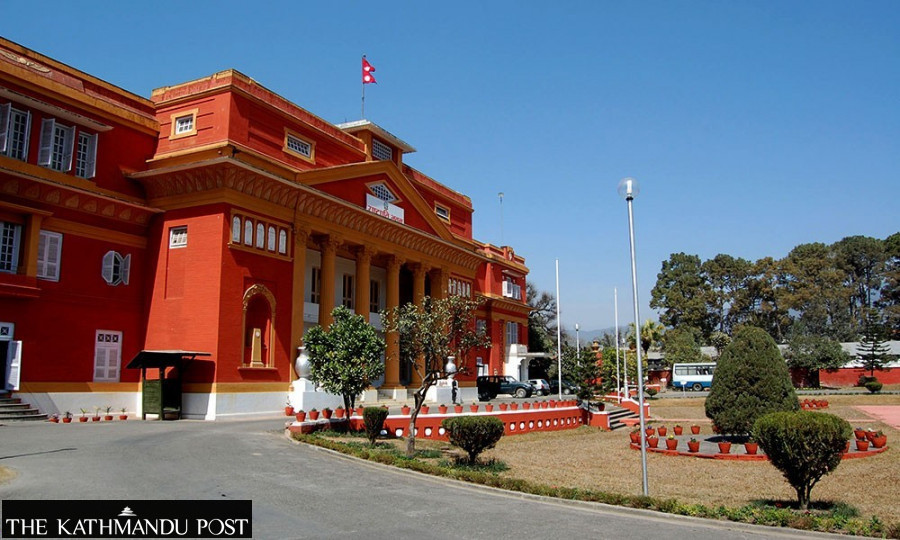Politics
Raging debate: Can former chief justice be head of state?
Most legal experts say the Constitution doesn’t allow it. But some consider the presidency an exception.
Tika R Pradhan
With parties focusing on government formation after the Election Commission presented its final report to the President, speculations are rife over candidates for the head of state both from inside and outside the political parties.
But political leaders have refuted reports that they discussed presidential candidates from outside political parties as that would not be tenable in a multi-party system.
“That is not possible,” Ram Chandra Poudel, the Congress senior leader, who is also an aspirant for the top job, told the Post. “Seeking a non-political figure [for President] is a bad idea in a multi-party system.”
The issue of a non-political candidate for President suddenly erupted after former chairman of the Council of Ministers Khilaraj Regmi went to meet Prime Minister Sher Bahadur Deuba at Baluwatar on Wednesday.
There are also speculations that top leaders including CPN (Maoist Centre) chair Pushpa Kamal Dahal and Prime Minister Deuba are trying to project former chief justice Kalyan Shrestha as the new presidential candidate.
The speculations over a non-political figure for new President have surfaced as both the leaders of the ruling coalition—Congress President Deuba and Maoist Centre chair Dahal—are laying claims to the prime ministerial position. Dahal has been demanding the executive position saying he played a crucial role to make Deuba prime minister, but Deuba is not keen on handing over the helm to Dahal; the current prime minister also wants a non-political figure as President.
Following the ‘controversial’ role played by the two Presidents—Ram Baran Yadav and Bidya Devi Bhandari—leaders have started discussing possible non-political figures they could trust as the head of state.
However, legal eagles and constitutional experts have said the constitution prohibits former chief justices from becoming President although Paramananda Jha was elected Vice-president despite being a former justice of the Supreme Court.
“Irrespective of what happened with Paramananda Jha, the Constitution bars former chief justices from becoming President,” said Bhimarjun Acharya, a constitutional expert. “Though both Khilaraj Regmi and Kalyan Shrestha are capable presidential candidates, their choice for the top state position is sure to impinge on the independence of the judiciary.”
Jha was elected as per the interim constitution that was replaced by the Constitution of Nepal in 2015.
Some constitutional experts said former chief justices Regmi and Shrestha have been projected by foreign power centres. Political leaders who became Presidents–Ram Baran Yadav and the incumbent Bhandari—apparently couldn’t be impartial in how they handled various power centres.
Many others, including some politicians, however, are against the idea of electing non-political figures as President, partly because there are many top politicians in the ruling coalition who need to be appeased.
Dev Prasad Gurung, general secretary of the Maoist Centre, a key constituent of the ruling coalition led by the Nepali Congress, said bringing in a non-political President was unthinkable.
“Neutral, partyless, or beyond the party–however you put it, the concept of democracy does not include them,” said Gurung, while addressing a function at Sambad Dabali on Friday. “Or you should have a partyless system.”
He claimed that at a time the national interest is in jeopardy, politicians should not think of alternatives to the party-system.
Gurung told the Post that there had been no discussions on looking for Presidential candidates from beyond the political parties.
There are many aspirants for the job from across the party lines.
They include leader Jhalanath Khanal and even party chairman Madhav Nepal from CPN (Unified Socialist); Vice-president Nanda Bahadur Pun, former Prime Minister Baburam Bhattarai, former speakers Agni Sapkota and Krishna Bahadur Mahara and Jayapuri Gharti from the CPN (Maoist Centre); and Ram Chandra Poudel, Krishna Sitaula and Gopal Man Shrestha from the Nepali Congress.
Though the homework for picking a new President is in full swing, the presidential election will be held in only February, a month before the expiry of the incumbent’s term. President Bidya Devi Bhandari was re-elected for a five-year term on March 14, 2018.
Former Supreme Court judge Balaram KC claimed the very idea of considering former chief justices for president is erroneous and harmful to the constitution.
“The constitution bars former justices of the Supreme Court from holding executive positions [other than in the National Human Rights Commission], so that they would not compromise on justice delivery in the hope of landing plum jobs after retirement,” KC told the Post. “The government has also arranged for an ample pension to cover their post-court life.”
KC said Nepal has different provisions for former justices and former chief justices compared to India, but there have been attempts to misinterpret the constitutional provision in various ways.
“Earlier too, a sitting judge was made chair of the council of ministers by flouting the constitution,” KC said. “This time too, exercises are afoot to twist the constitution.”
However, some legal experts are of the view that former chief justices can still be President, just like Paramananda Jha became the Vice-president, as it is an elected position and not a political appointment.
“The constitution bars former chief justices from becoming President,” said Raman Shrestha, a senior advocate who served as Attorney General during the premiership of Pushpa Kamal Dahal. “[But] it’s Nepal and anything can happen here.”
Shrestha was referring to an international power centre’s push for a non-political candidate for new President.
Asked whether former chief justice Shrestha was a candidate top coalition leaders like Dahal and Prime Minister Deuba were considering, senior advocate Shrestha replied that it was unlikely given the former chief justice’s bias against the Maoist movement.
Former chief justice Shrestha said he learnt about his name cropping up for the presidency only from the media. “No party has consulted me, nor have they asked me about my interest,” Shrestha told the Post. “I learnt from media reports that parties were considering me. I don’t know if that is true.”




 13.12°C Kathmandu
13.12°C Kathmandu














